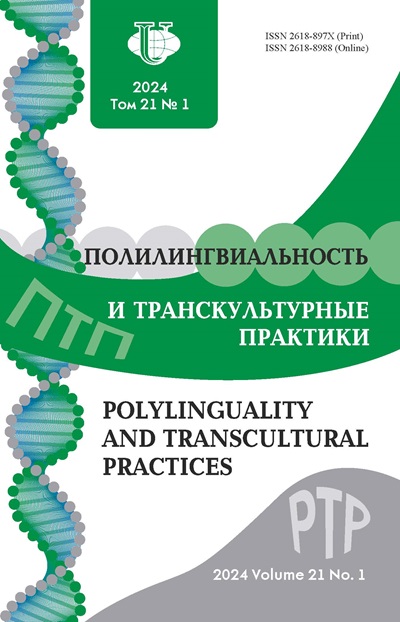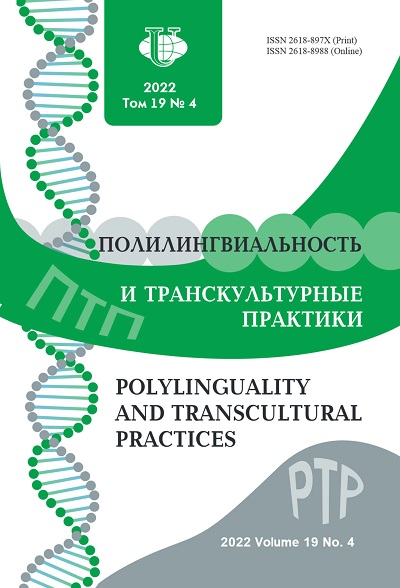Patricia Grace’s “Potiki”: Indigenous Māori Narrative Through the Lens of the Transculturalism Theory
- Authors: Galaktionov S.S.1, Proshina Z.G.1
-
Affiliations:
- Lomonosov Moscow State University
- Issue: Vol 19, No 4 (2022)
- Pages: 637-649
- Section: LITERARY SPACE
- URL: https://journals.rudn.ru/polylinguality/article/view/32863
- DOI: https://doi.org/10.22363/2618-897X-2022-19-4-637-649
Cite item
Full Text
Abstract
The article examines the identity and work of Patricia Grace, a New Zealand writer of the Māori Renaissance period. Her fate echoes the life stories of many indigenous Māori people with mixed origins, and in regards to that it is interesting to see how this aspect of her existence was reflected in the works she created. Within the framework of this study, Grace’s identity and her literary style are analyzed from the standpoint of theory of translingualism and transculturalism. Particular attention is paid to the criticism and reception of Grace’s work in the literary community and to the development of the most suitable approach to studying her texts. This approach is developed on the basis of the concept of transculturation by F. Ortiz, research by Z.G. Proshina in the field of translingual literature, post-colonial research by H.-K. Trask and the works of M.V. Tlostanova on gender philosophy. Grace’s most famous novel “Potiki” was chosen as an example that confirms the transcultural and translingual nature of her literature. The analysis of the novel allows one to read it as not just a story-driven novel, but as a complex text that contains many elements of Māori culture hidden from a non-indigenous reader.
About the authors
Semyon S. Galaktionov
Lomonosov Moscow State University
Author for correspondence.
Email: semengal98@mail.ru
ORCID iD: 0000-0001-9025-5522
first-year postgraduate student at the Faculty of foreign languages and regional studies
1, Leninskiye Gory, Moscow, 119991, Russian FederationZoya G. Proshina
Lomonosov Moscow State University
Email: proshinazoya@yandex.ru
ORCID iD: 0000-0002-0570-2349
doctor of Philology, professor at the Chair of theory of teaching foreign languages at the Faculty of Foreign Languages and Regional Studies
1, Leninskiye Gory, Moscow, 119991, Russian FederationReferences
- Kuiper, K. 2020. Patricia Grace. Encyclopedia Britannica. URL: https://www.britannica.com/biography/Patricia-Grace (accessed: 28.06.2021).
- Kellman, S.G. 2000. The Translingual Imagination. University of Nebraska Press. Print.
- Canagarajah, S. 2002. Multilingual writers and the academic community: towards a critical relationship. Journal of English for Academic Purposes. 1: 29—44. Print.
- Proshina, Z.G. 2016. Problemy i perspektivy translingval’nyh i transkul’turnyh kontaktov (vvedenie k tematicheskomu vypusku zhurnala). The Humanities and Social Studies in the Far East 2 (50): 6—9. Print. (in Russ.)
- Canagarajah, S. 2013. Translingual practice: Global Englishes and cosmopolitan relations. London and New York: Routledge, Taylor and Francis Group. Print.
- Proshina, Z.G. 2017. Translingvizm i ego prikladnoe znachenie. Vestnik RUDN. Seriya: Voprosy obrazovaniya: yazyki i special’nost’. 14 (2): 155—170. Print. (in Russ.)
- Ortiz, F. 1995. Cuban Counterpoint: Tobacco and Sugar. Durham, and London: Duke university Press. Print.
- Said, E.W. 1993. Culture and Imperialism. London: Vintage. Print.
- Tlostanova, M.V. 2011. Transkul’turaciya kak model’ sociokul’turnoj dinamiki i problema mnozhestvennoj identifikacii. Voprosy social’noj teorii. V: 126—149. Print. (in Russ.)
- Tlostanova, M.V. 2004. Postsovetskaya literatura i estetika transkul’turacii. Zhit’ nikogda, pisat’ niotkuda. Мoscow: Editorial URSS. Print. (in Russ.)
- Zhukova, I.N., Lebed’ko, M.G., Proshina, Z.G., Yuzefovich, N.G. 2013. Slovar’ terminov mezhkul’turnoj kommunikacii. M.G. Lebedko, Z.G. Proshina (eds.). Moscow: Flinta : Nauka. Print. (in Russ.)
- Trask, H.K. 1991. Natives and Anthropologists: The Colonial Struggle. The Contemporary Pacific 3 (1): 159—167. Print.
- Pearson, B. 1982. Witi Ihimaera and Patricia Grace. In Cherry Hankin (ed.) Critical Essays on the New Zealand Short Story. Auckland: Heinemann. Print.
- McLeod, A. 1987. Private Lives and Public Fictions. In Shelagh Cox (ed.). Public and Private Worlds: Women in Contemporary New Zealand. Wellington: Allen and Unwin. 67—81. Print.
- Anderson, L. 1986. Maoriness and the Clash of Cultures in Patricia Grace’s Mutuwhenua. World Literature Written in English 1: 188—190. Print.
- Tlostanova, M.V. 2011. Neevropejskaya gendernaya filosofiya v kontekste mezhkul’turnogo dialoga. Vestnik RGGU. Seriya ‘Filosofiya. Sociologiya. Iskusstvovedenie’ 15 (77): 102—113. Print. (in Russ.)
- Fuchs, M. 1994. Reading toward the Indigenous Pacific: Patricia Grace’s Potiki, a Case Study. Boundary 2. 21 (1): 165—184. Print.
- Te Aka Online Māori Dictionary: tūāhu. URL: https://maoridictionary.co.nz/search?idiom=&phrase=&proverb=&loan=&histLoanWords=&keywords=tuahu (accessed: 09.03.2021).
- Grace, P. 2020. Potiki. Penguin Books. Print.
- Binney, J. 2004. Maori Oral Narratives, Pakeha Written Texts: Two Forms of Telling History. New Zealand Journal of History 38 (2): 203—214. Print.
- Metge, J. 1976. Rautahi: The Maoris of New Zealand. London: Routledge. Print.















